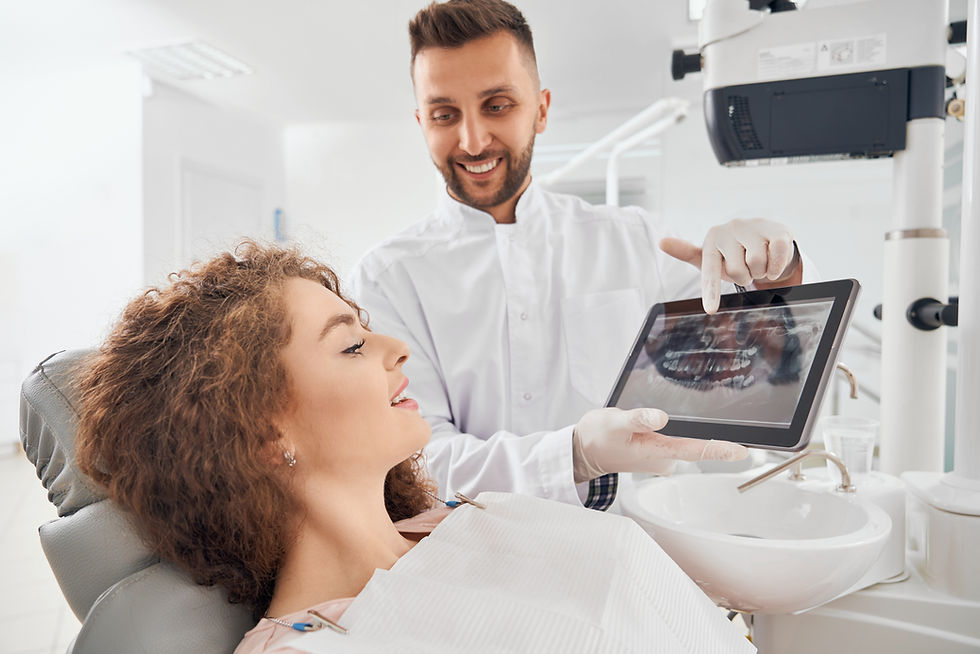Know What Causes Black Teeth in Adults?
- Smiles of Virginia
- Apr 4, 2025
- 3 min read

Black teeth in adults can be alarming, often raising concerns about oral hygiene, diet, or underlying health issues. If you've noticed your teeth turning dark or developing black spots, it's important to understand the potential causes and how to treat or prevent them. In this blog, we’ll explore what causes black teeth in adults, the common symptoms, and how to manage this dental issue.
Common Causes of Black Teeth in Adults
Understanding the root cause is the first step toward effective treatment. Here are the most common reasons why black teeth may occur in adults:
1. Tooth Decay
Tooth decay is one of the primary causes of black teeth. As cavities progress, they can turn dark or black, especially if left untreated. Bacteria break down the tooth enamel, eventually causing discoloration and even structural damage.
2. Tartar Buildup
Tartar, or hardened plaque, can accumulate along the gum line and between teeth. Over time, this buildup may turn black due to staining from food, drinks, or tobacco, making teeth appear discolored.
3. Staining from Food and Drink
Regular consumption of dark-colored beverages like coffee, tea, red wine, and cola can stain the teeth. Over time, these stains may darken to a brown or black shade, especially without proper dental hygiene.
4. Smoking or Tobacco Use
Tobacco is notorious for staining teeth. Prolonged use of cigarettes or chewing tobacco can cause the enamel to take on a yellow, brown, or black hue.
5. Dental Restorations
Old or deteriorating dental fillings, especially metal-based ones, can sometimes cause a black tint around the tooth. This can be due to leakage or corrosion of the filling material.
6. Trauma or Injury
A damaged or dead tooth resulting from trauma may turn black. If the blood supply is cut off due to injury, the inner tissue of the tooth may die, causing a dark discoloration.
7. Poor Oral Hygiene
Neglecting regular brushing, flossing, and dental checkups can lead to plaque buildup, decay, and eventually black teeth. Maintaining proper oral hygiene is essential for preventing such issues.
8. Medications and Supplements
Certain medications, such as liquid iron supplements or tetracycline antibiotics (especially when used during childhood), can lead to tooth discoloration over time.
How to Treat Black Teeth
Treatment for black teeth depends on the cause:
Professional Cleaning: To remove tartar and surface stains.
Fillings or Crowns: For cavities or damaged teeth.
Root Canal Treatment: If the tooth is infected or dead.
Teeth Whitening: For stains due to food, drink, or smoking.
Extraction: In severe cases where the tooth cannot be saved.
Preventing Black Teeth
Here are a few tips to help prevent black teeth:
Brush at least twice a day with fluoride toothpaste.
Floss daily to remove plaque between teeth.
Limit consumption of staining foods and drinks.
Quit smoking or using tobacco products.
Visit your dentist regularly for check-ups and cleanings.
When to See a Dentist
If you notice any dark spots or discoloration on your teeth, it’s best to consult a dentist. Early diagnosis can prevent more serious dental problems and help restore your smile.
Now that you know what causes black teeth in adults, it’s clear that both lifestyle habits and dental health play a major role. Don't ignore black teeth—they could be a sign of something more serious. With proper care and regular dental visits with dentists, you can maintain a healthy, bright smile.






Comments